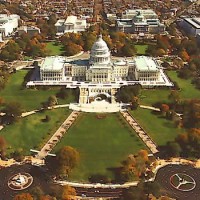
Russell Arben Fox has treated us to his reflections of the recently concluded APSA annual meeting here. It would be surprising if there were anything as thematic as what he reports here, given that the Association’s annual meeting is a sprawling and massive sea of academics who at best gather in cliques of academic specialty, ideological similarity, or graduate school camaraderie.
But, perhaps at least by dint of its name, there was in the past one common thing that held the Association together: at one point, it might have been understood what the word “American” meant in the association’s title. “American” designated an association that was physically located in, and even derived its identity from, the United States of America. While not limited to American citizens or faculty working in America, the designation indicated at the very least that the Association was born in the recognition of the basic claims and reality of nations.
In holding the recent conference in Toronto, Canada, the Association (and, by extension, the profession) has implicitly raised a question about this basic identification. I say “implicitly” because I know of no sustained discussion of the decision to place the Association meeting outside of the United States. Recently the decision to site the conference in New Orleans in 2011 received discipline-wide scrutiny because of perceptions that Louisiana law would make it an unwelcome location for gays; however, the decision to locate the recently concluded meeting in Canada received little comparable scrutiny (a small “retaliation” protest raised questions about academic free speech in light of Canada’s “Human Rights Commissions,” but was summarily dismissed by the Association and received only modest attention. Most of its signatories attended the conference).
Coming on the wake of a panel at last year’s meeting in which it was discussed – and an Association committee was formed to explore – whether the subfield of “American Government” should be eliminated as an outmoded nation-centered field that gives undue recognition or stress upon a particular place, the Association’s under-discussed decision to site the annual meeting in Canada gives pause. “Political Science” – like all the social sciences – was created under the aspiration to treat human phenomena with the same form of scientific objectivity, analysis, and rigor as was taking place in the natural sciences. A distinctive feature of the natural sciences is its universality – what is discovered by a particular researcher in one place is and ought to be available and replicable by a researcher anywhere else on the globe. Scientists often consider themselves to be a society of investigators who transcend place and time.
By contrast, the study of human things – especially politics – at least in its inception implied the recognition of the reality of human particularlity – meaning place, history, culture, politics, identity, loyalty, exclusion, patriotism, war, solidarity, and so on. The American Political Science Association was born of a mixed or even confused mandate: aspire to the objective, universal and disembodied condition of the natural sciences in the study of the human phenomenon of politics. If the word “Science” in the title “American Political Science Association” implied one way of being in the world, the other three words – “American,” “Political,” and “Association” – cut against the implications of that particular vocation. If largely understated, it was long understood that the field of American Government was legitimate because it mattered where one lived, and further, that one’s students know more about one’s own polity than those of other nations. Citizenship was a large component in the consideration of what mattered.
The decision to site the most recent meeting in Canada was largely treated – if discussed at all – as an administrative and possibly tourist matter, a decision to encourage international comity. However, implicitly it raises some large questions that have gone largely unexplored. At this point in the history of the Association, does it make sense to continue to call it the American Political Science Association. Given drifts in the profession away from implicit recognition of the legitimacy of place and history and citizenship, why retain this marker of distinction? Does the decision to site the most recent meeting in Canada imply that we have become the North American Political Association? If so, is this not an offensive exclusion of Central and South America? At that point, why limit it at all to the Americas? How can it be further justified to hold the vast majority of annual meetings in the United States?
The Association and many of its members would doubtless tut-tut that any such prospects were clearly not the intention in its generous decision to spread some of its wealth and legitimizing aura north of the border (they’d be “shocked, shocked,” that anyone could suggest any such thing). However, it’s precisely by leaving the issue unexplored and underarticulated that the Association is sending strong signals about (at the very least) its tendency to be intentionally subject to the prevailing winds of transnationalism, globalism and cosmopolitanism. The aim is to be placeless, to show ourselves – as true scientists – to be citizens of the world, belonging at once everywhere and nowhere.
For the first time in probably 20 years, I did not attend this year’s conference. I gladly remained home with family and friends on Labor Day weekend, ate barbeque, drank beer, saw a baseball game, and flew the American flag in honor of the American worker. On that weekend at least, I decided to behave as a father, husband, neighbor and citizen – and decidedly, not as a scientist.





10 comments
Amod Lele
Thank you. I’m associated as a scholar with the American Academy of Religion, which this year is meeting in Montréal. (They met in Toronto seven years ago.) I personally benefit a great deal from this arrangement, as I am a Canadian living in the US, and love Montréal deeply and look forward to a chance to go there. But at the same time, I agree that such a move raises questions about the organization’s purpose, questions that are not actually being asked and addressed. I’m for many aspects and forms of globalization, but it is worrisome when they happen without debate.
Hudson
Toronto might have been a “polite” town in the era when Jane Jacobs lives there. My sense is that it is a more fractious place today, with mandated Canadian content rules, large heapings of immigrants of color feasting on generous government subsidies, crime, and the nation’s onerous Human Rights Commission that takes political correctness to a “whole nother” level. Read some of Mark Steyn’s struggles with his books vs. local Islamic clerics and the HRC. You might be glad you live south of the border despite our many problems.
Torrey
Does this mean that the next time my Canadian Political Science professors require citations to adhere to APSA guidelines, I can fight it?? The Americans…taking over Canada one citation at a time…
Caleb Stegall
Vonnegut aint just past prime, he’s done gone spectral…..God Rest His Sardonic Soul. But I’m sure you already knew that.
I was being polite, in a Vonnegut kind of way.
So it goes.
D.W. Sabin
The notion that Louisiana Law might make N’arlins an “unwelcome location for gays”….aside from the fact that a Professional Organization might make this an issue….is one of the funniest damned things I’ve read in some time. Maybe they were not aware that N’arlins is the World Capital of Transgression and that if the law started cracking down on “non-normative” behavior down there in Creole Heaven, well…they’d have to start in the Governor’s office and work down. Cripes, a third of the population of the Crescent City practices Santeria or some liquid variant thereof. Instead, maybe they were a tad chary of hosting a Political “Science” convention in a place that so loudly refutes there is any science whatsoever to American Politics besides that ole Nathan Bedford Forrest nougat : “Them who gits thar the fastest with the mostest, wins”….and its opposite.
With that excuse, I reckon the convention committee was jest bein a little “political” in their professed deliberations. Toronto is a much more polite place anyhow and in this modern “industry” of Conventioneering…something hatched by those of the Chamber of Commerce Bent…and I do mean “bent”….. politeness counts. After all, as I understand it, Political Science is one of the polite sciences.
Pardon my tartness, I have to throw a couple grand into the shredder to go to my own convention in Chicago this weekend and satisfy another Convention Industry Conceit: “Continuing Education”. There is at least the Blues, the Chicago Art Institute and jazz. None of which of course, remotely meet the August Standards of “Continuing Education”…..but another good idea gone institutionalized into idiocy in pursuit of penury.
Vonnegut aint just past prime, he’s done gone spectral…..God Rest His Sardonic Soul. But I’m sure you already knew that.
Patrick Deneen
Caleb,
I believe that piece of “reality outstripping fiction” was called “The Vietnam War.”
Caleb Stegall
Someone should write a blackly comedic novel about a group of academic political scientists planning and attempting an invasion of any kind. Would be hillarious. Sounds live Vonnegut material, but he’s way past prime.
Patrick Deneen
Russell,
Interesting. Perhaps the opposite conclusion is warranted: the siting of the meeting in Canada was a subtle form of imperialism, and the flying of the U.S. Flag a declaration of territorial expansion. Perhaps the meeting hid a number of operatives who were gathering information for an updated invasion plan of Canada.
I do wonder what all our American political scientists made of those flags. And the Canadian political scientists, not to mention Canadian patriots, for that matter.
Russell Arben Fox
Well said, Patrick. Of course, given the openness of APSA to participation from scholars from Canada–as well as South Korea, Germany, Great Britain, France, Japan, Turkey, and more–over the years, the notion that APSA is no longer a “sited” (much less “local,” and certainly not “patriotic”) organization is a somewhat late complaint. One might also suggest that, in having become a part of, and therefore having made friendships and commitments in conjunction with, the contemporary academic vocation, with all its distances and relocations, attending that annual conference, wherever it is located, is an act of affiliation and belonging to one’s companions and fellow thinkers, a way of saying “however separated we may be, we’ll always have APSA.” (That sounds dreadfully maudlin, though, doesn’t it?)
In any case, I should note that the American flag was prominently displayed on several of the rostrums in various panel rooms, so the globalization of our shared “science” (and really, besides the rational choice folks, who actually ever calls it that today, anyway?) is not yet total, thank goodness.
Comments are closed.